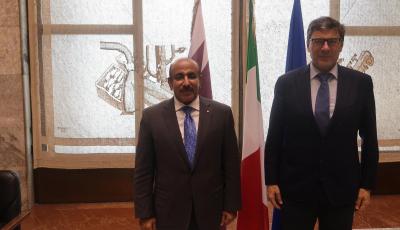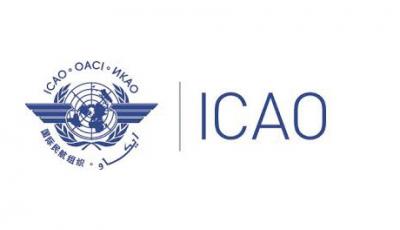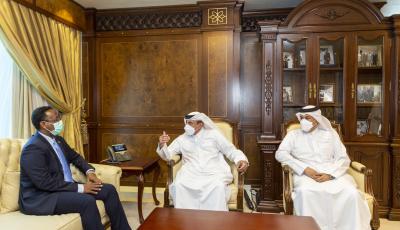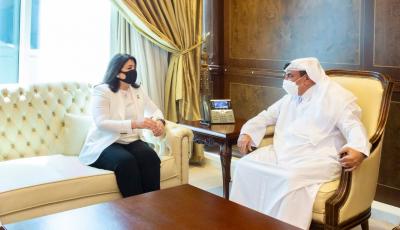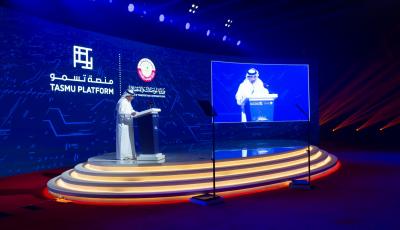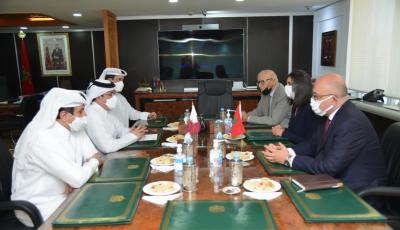Minister Launches “TASMU Platform” to Solidify Smart Qatar Vision
Doha – QatarMinister of Transport and Communications HE Jassim Saif Ahmed Al-Sulaiti launched the TASMU Platform officially today at an event held this morning under the patronage of His Excellency Sheikh Khalid bin Khalifa bin Abdulaziz Al Thani, the Prime Minister and Minister of Interior.The event was attended by Her Excellency, Dr. Rana Abdullah Al-Fares, Minister of Public Works and Minister of State for Communication and Information Technology Affairs of the brotherly State of Kuwait, several ministers, high-profile officials, technology firm representatives, as well as many remote guests who watched the launch event via livestreaming online.The TASMU Platform aims to harness advanced technology and innovation to provide smart solutions and applications across five priority sectors: transportation, healthcare, logistics, environment, and sports. The Platform has been designed to create and foster an enabling digital environment by powering and linking all sectors, smart solutions, and digital services in Qatar to drive sustainable economic diversification, address key national challenges and support decision making, innovation, research, entrepreneurship, and businesses.In his opening speech, Minister Al-Sulaiti said that Qatar’s visionary leadership realized years ago the importance of investing in emerging technologies and innovation to drive sustainable development and the national economy. The Ministry of Transport and Communications, he said, has been actively working towards realizing this vision, which will secure a bright future for the State of Qatar and our responsibility was to develop the right digital infrastructure and technical capabilities that will help all key sectors in Qatar to remain at the forefront of information and communications technology on a global level, thus ushering in the digital innovation era with full confidence.He added: “Today, we came together to witness the launch of the TASMU Platform, a remarkable achievement for the TASMU program on its journey to build a smart Qatar and enhance the digital economy for Qatar and the region. The Platform, which is one of the most innovative cloud-based smart city solutions with world-class artificial intelligence, big data and cybersecurity capabilities, was developed in conjunction with an international consortium led by Ooredoo.”He said that the TASMU Platform sits at the heart of the Smart Qatar Program - connecting government entities and private businesses operating in priority sectors to coordinate efforts and combine goals. The sector alignment, he explained, will ensure that users can have access to comprehensive smart solutions from a single source. The TASMU Platform will also be a national source of information that will provide accurate analytics and insight across sectors to support decision-making, resource management, and focused investments to ensure the growth of our economy and society.MOTC’s Assistant Undersecretary, Digital Society Development, HE Ms. Reem Mohammed Al-Mansoori said: “The TASMU Platform is the backbone of Qatar’s digital infrastructure and will enable the collection and analysis of data across the nation. This will support the development of collaborative smart solutions that will enhance everyone’s daily life. The Platform’s large cloud storage and high-computing capacity, combined with services such as payment gateways, data analytics, weather, and traffic control systems, 5G and IoT, are available to public and private sectors, as well as developers across the country. This reflects why the TASMU Platform sits at the heart of all services and smart solutions that will be provided in Qatar.”She added: “The TASMU Platform performs three fundamental functions. Firstly, it promotes communication between government entities, businesses, and individuals across sectors to ensure collaborative efforts when developing smart solutions in Qatar. Secondly, it will provide the public and private sectors with advanced technologies that can be utilized to develop smart solutions and applications that meet national KPIs. Third, and lastly, it will store and analyze national data and develop key insights to support decision-making and resource management across all organizations in Qatar.”Sheikh Nasser Bin Hamad Bin Nasser Al Thani, Chief Commercial Officer at Ooredoo, said: “We were immensely proud to launch TASMU Platform and kickstart the phenomenal TASMU Program that will propel our country towards its goal of becoming one of world’s advanced smart countries. As a leading telecommunications operator with innovation firmly at the heart of our strategy, working with some of the world’s greatest technology innovators, we are committed to supporting Qatar National Vision 2030 and the digital transformation of our beloved country. We are proud to be playing such a pivotal role in this inspiring project with our esteemed partners and extend our gratitude to the government of Qatar for placing its trust in us to deliver TASMU Platform.”Several TASMU smart solutions will operate on the TASMU Platform, including Virtual Consultation; a Healthcare smart solution developed in partnership with the Ministry of Public Health to ensure that with the onset of the COVID-19 pandemic, the local community could access medical advice, diagnoses and prescriptions from the comfort and safety of their homes.The TASMU Platform also houses the TASMU Digital Farmer Community, an Environment smart solution developed in conjunction with the Agricultural Affairs Dept. of the Ministry of Municipality and Environment (MME). It leverages the TASMU Platform’s integration of real-time weather data from the Qatar Meteorology Department and high-resolution satellite imaging from the Center for Geographic Information System to assist farmers with professional advice on production planning, crop best practices and pest and disease management.TASMU’s National Food Security Analytics smart solution, which was formed in collaboration with the Food Security Dept. at MME, also unlocks the power of the TASMU Platform’s AI-driven decision-making capabilities and acts as a centralized database integrating insights from various stakeholders to provide recommendations to government officials and business owners that will help safeguard national food security.To further the nation’s economy and quality of life, the state-of-the-art cloud-based TASMU Platform aims to orchestrate Qatar’s digital eco-system by acting as a central body that breaks silos between priority sectors, government entities and individuals. The Platform is designed to be accessible from anywhere and at any time. It is based on Azure Cloud, offering myriad Software-as-a-Service, Platform-as-a-Service and Infrastructure-as-a-Service capabilities.Based on these building blocks, the Platform allows public and private entities to access its large cloud storage and high-computing power to readily push smart solutions to market with the help of various platform services such as payment gateways, data and video analytics, IoT, and machine learning (ML) and AI.The TASMU Platform offerings will holistically enable a nationwide digital transformation while aspiring to meet the Qatar National Vision 2030. The launch of the Platform includes a comprehensive offering of 37 products and services that are in line with TASMU’s value proposition and span across five main pillars: IoT device onboarding & management, enablers & accelerators, smart city value addition, revenue generation and platform support.Furthermore, the TASMU Platform features some of the world’s best data capabilities, such as data ingestion, processing, integration and more, supported by a strong governance model that is designed to encourage cross-sector collaboration and data-sharing, while ensuring data privacy and security. It will enable large scale governmental smart-city solutions by interconnecting data and leveraging key advanced products such as its Geographic Information System platform capabilities that are powered by innovative satellite imagery technology.Additionally, the Platform will provide SMEs with the opportunity to leverage advanced data analytics and managed services, along with key SOC & NOC offerings, to assist operations and security. Businesses will be able to quickly build, deploy, and update their solutions anywhere, which will help accelerate Qatar’s digital ecosystem. The TASMU Platform further aims to launch more than 200 smart solutions over the next decade, to create a smart, sustainable, and vibrant society with cutting-edge technologies and innovation.Click here to visit TASMU Platform
